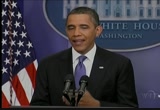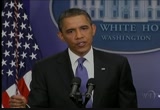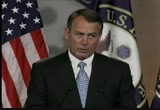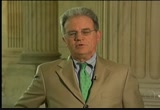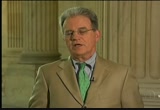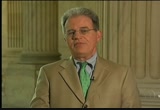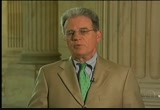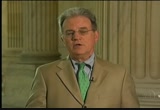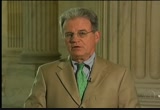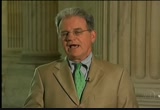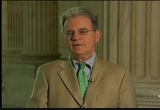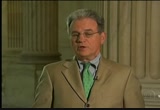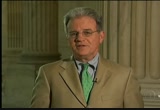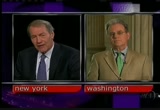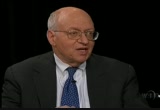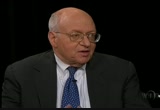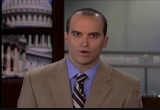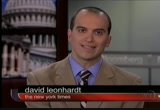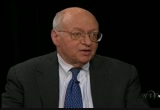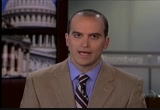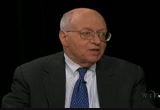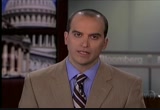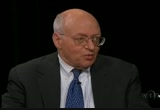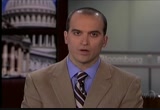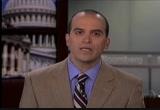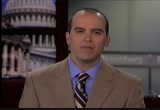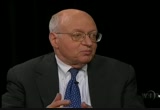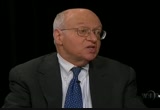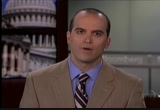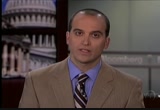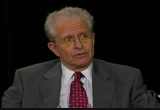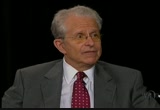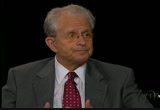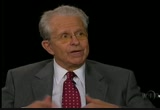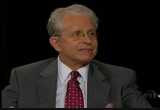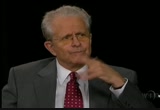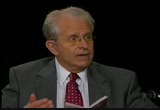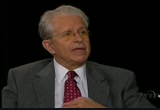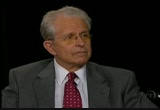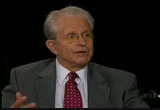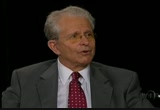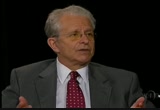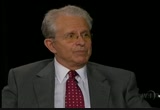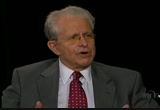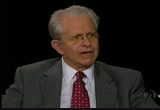tv Charlie Rose WHUT July 12, 2011 9:00am-10:00am EDT
9:00 am
>> rose: welcome to our program. we begin this evening with the debt limitation talks takes place in washington and reaction from president obama's press conference earlier today begiing with senator tom coburn of oklahoma, a republican. >> i believe it's possible to get a deal. that's a totally different statement than whether or not we will get a deal. and the possibility i see is a lot of republicans would agree that we could reform the tax code, lower the rates, and increase the revenue of the federal government and we would be willing to do that if they saw significant enough cuts in entitlements and discretionary spending. >> rose: we continue our discussion of the debt talks taking place in washington with professor martin feldstein of harvard university and david leon heart of the "new york times". >> ii goout and i buy a solar
9:01 am
panel for my house i gate tax brea well, instead the government cod have sent me a check or could have sent a check to the company that made the solar panel. so that to me is govement spending. and i think that the debate between the republicans and the mocrats over closing down some of those spendin that are built into the tax code is a mistake. >> loo raising taxes by itself is not good for the economy in the short term. it can help with the deficit. but the question is the magnitude, right? and i think we've learned in recent years that e magnitude of the economic effect of tax increases is smaller than is often claimed. and so we have a huge deficit, we're not raising taxes for fun, we're raising taxes because the alternative to no tax increase is really radical changes to medicare and social security. >> rose: we conclude this evening with professor lawrence tribe of the harrd law scho. he is a constitutional law professoand has initiated a suit against the veterans
9:02 am
affairs department in order to sere housing for homeless veterans in los angeles. >> we're suing the government to make facilities available for these vets who... i mean, they are so freaked out that they can't take a bus across town without thinking that this there's going to be an i.e.d. so they have to be taken care of in permanent housing facilies right near where they live. >> rose: debt limitation talks and a lawsuit on behalf of homeless veterans when we continue. every story needs a hero we can all root for. who beats the odds and comes out on top. but this isn't just a hollywood storyline. it's happening every day, all across america. evy time a storefront opens. or the midnit oil is burned.
9:03 am
or when someone chases a dream, not just dollar. they are small business owners. so if you wanna root for a real hero, support small busiss. shop small. captioning sponsored by rose communications from our studios in new york city, this is charlie rose. >> rose: the debe in washington over the budget and the debt ceiling intensified this weekend and then today president obama continued to push for the biggest possible deficit reduction deal up to $4 trillion in budget savings over ten years. speaking at a press conference this morning, his senator ted kennedy as my weeks, the
9:04 am
president used blunt language to make his case. >> if we think it's hard n imaginhow these guys are going to be thinking six months from now in the middle of election season when they're all up. it's not going to get easier, it's going to get harder so we might as well do it now. pull off the band-aid. eat our peas. (laughter) now's the time to do it. if not now, when. >> rose: the president at dressed the divide on taxes. >> nobody has talked about increasing taxes now. nobody has talked about increases... increasing taxes next year. what we have talked about is that starting in 2013 that we have gotten rid of some of these egregious loopholes that are benefiting corporate jet owners or oil companies at a time where
9:05 am
they're making billions of dollars of profits. >> rose: and there were words of praise for house speaker boehner. >> my experience with john boehner has been good. i think he's a good man who wants to do right by the country i think that it's, as chi alluded to, the pitics that swept him into the speakship were good for a midte election they're tough for governing. and part of what the republin caucus generally needs to recognize is tt american democracy works when people list toeach other, we're willing to give each other the benefit of the doubt. >> rose: boehner, who rejected the $4 trillion package over the weekend, responded to president obama's remarks today. >> so we've been involved in i think, very sincere and honest negotiations and honest
9:06 am
discussions. i think the president and i both understand that the nation faces a very difficult decision. and there clearly is no peonality difference between the president and i. i get along with him fine. this boils down to two things-- and i said it on saturday night-- the president continuess to insist on raising taxes and they're just not serious enough about fundamental eitlement reform to solve the problem for the near to intermediate future. i heard... there were no tax increases ever on the table. there was never any agreent to allow tax rates to go up in any discussion i've ever had with the white house. not once. >> rose: later this afternoon, the president met agn with top congressional leers. both parties have agreed to meet daily until a dl is reached. without a deal, the lust default
9:07 am
on august 2. joining me from washington as we begin our program is senator tom coburn of oklahoma. he recently pulled out of the bipartisan group of senators known as the gang of six. he was recently on this program and we had a thorough discussion of the issues and i'm not sure they have changed. senator, what did you think of what the president said today and obviously of what congress... house speaker boehner said over the weekend. >> well, i think first of all the president realizes we have to get a big deal. as we discussed a couple of weeks ago or last week, charlie, if you don't send the appropriate signal to international financial communities, you can raise the debt ceiling but the interest costs are going to go through the roof. so it has to be a big deal and so i think he recognizes that. and i think speaker boehner subpoena looking at the reality of what's going to happen in 2013 without agreeing to what the president said. we're going to have 4.9% increases on taxes on everybody earning er $200,000 a year
9:08 am
anyway just from the affordabl care act. so you'll see significant increase in taxes withoutany increased taxes put on the table. i think they can do a deal and i think a deal can get done if, in fact, we do take away a lot of the tax eendires and lower the rates so thatwe get an economic boom that would come a that. so i think it's still possible. i think things tend to happen in washington when they have to so my slope that something will come togher and occur. >> rose: how long do you think it will take? >> i don't kw. you know, these things go down to the wire. people only leave their political positions to do the right policy things when they have to. they don't have to yet and my hope would be that both the president and the speaker and our leaders would think about policy positions more than they would the next election. >> rose: has the president-- first the president-- come to where you think he ought to be? >> i think his... you know, i
9:09 am
really wrestle with this idea that we're going to markedly increase taxes on the very people that are going to be the dynamics of change for job creation. and that's not to defend the wealthy paying their share, they already pay well more than their share. the question is do we grow the economy or do we tax the economy? and those ar cotervailing stimuluss that won't... that will have different effects. and so i thinkhe's going to have to move some on the taxes. i think he can get a big deal and i think... i would tell you that alot of th people that i talked to i my ucus are willing to move on changing rates and eliminatg loopholes so i thk potential is there. but this ide of markedly creasing the rates... even thgh that's a pollinginner and we look the wealthy and say "you can pay more" in the long run it doesn't help our country it hurts it because we don't put that capital into job
9:10 am
creation. so my hope would be that we'd see a little movement there. >> rose: the president seemed to have a different tone in this press conference than he did previously. >> i think that's important. i think i said on your show... and i've said to other people i don't think if you want to negotiate with somebody you put your... poke your finger in the eye. that goes both ways. our side has done it as well. it's time for the grown-ups in the room to start getting down to the brass tacks and see where we can rch a compromise someone somewhere in the middle. >> rose: and what success are you having with your republican colleagues? because you seem to be at a different place than, say, mitch mcconnell is, your leader. >> well, i'm not sure that we would reject having a reform to the tax code. the difference is is new taxes and increasin tax rates is really terrible for the economy right now and it's opposite of
9:11 am
what the president did in the tax reduction bill of last year, recogning that you don't want to incrse the rates because of the precarious nature of our economy. so i think we can get and i think a lot my colleagues would agree a tax reform proposal that would modify a lot of the tax credits and some of the tax expenditures. there's $1.1 trillion a year in tax creditsnd tax expenditures and you can easily change $600, $700illion of that a year in lower rates, you'd get a real response in the economy because you'd see that money invested which would grow the economy. and the net cost would be maybe $150 billion. >> rose: am i missing something? is the president suggesting we raise the rates? >> yeah, he... i think his desire that rates on the wealthy above $250,000 go back up to... >> rose: oh, sure, right. he basically said his support for the bush tax cuts across the board were only for two years in terms of both but he would
9:12 am
probably continue always believing in the bush tax cuts for the middle-class. >> yeah. but that really... in terms of wanting the grow the economy, that doesn't make any sense righnow. until we're out of this and actually we have to do three things. one is we have to send the gnal which means we need $4.5 trillion over ten years to buy some time and send a signal. number to is we have to make sure our tax policy generates investment rather than generates tax avoidance that's number two. and number three is we really is to clean up the regulatory environmt so people are not inbited from doing the things that would cause them to create jobs. >> rose: whado you think of grover norquist's tax pledge? >> i agree with grover on 99% of what he's talking about. i think... i really think the government's too big. i think we're outside the bounds of the enumerated powers and i think the problem is too big government we need to put it on
9:13 am
a very strict atkins' style diet and lose about six or eight inches in its waistband. but i don't agree with him when it comes to tax expenditures that are stupid and calling that a tax increase if you take away the direct payments to somebody to get the todo something they already have todo. so in philosophy i agree, we need a smaller government, a more limited government, a more effective vernment, but i think the idea of somebody outside of congress telling us what our tax policy would be is ludicrous. >> rose: (laughs) this is what... i should make a point that we invited senator durbin and senator conrad tonight as well a they'll appear hopefully later this week. this is what david brooks said, as you well know. "if the republican party were a normal party it would take advantage of this amazing moment. it is being offered trillions of dollars in spending cuts in exchange for a few hundred miion dollarofevenue increases. if the debt ceiling talks fail
9:14 am
independent voters will see that democrats were willing to compromise but republicans were not. if responsible republicans don't take control, independents will conclude the republican fanaticism caused this default. they will conclude that republicans are not fit to govern and they will be right." david brooks. >> i don't agree that at all. that discounts the notion that the vast majority of people in this country thinkovernment's way too big and if you lo at them... look at what the role of the government is, i think that's a great insiders's vw, i don't think the that represents the view point of people across this country at all. >> rose: okay, but i suspect if the president said to you or you today the president mr. president, do you think the government's too big? would say, yes, i do. >> i think he would say that in certain limited areas but i don't think he actually believes that. >> rose: ah. >> the one thing i admire about him, his experience in life is
9:15 am
he believes in a vigorous and aggressive role for gernment in people's lives. look athe health care bill. that's exactly what that is. look at the policies of his administration. so i think our philosophys are very much different. i actually lieve in the enumerateive powers and i'm not sure he does. >> rose: does he bieve or not believe in a smaller government, as you were suggesting? >> charlie, i believe he wan to get adeal done and recognizes the financial straits that we're in and recognizes realistically that certain things are going to have to be cut. the problem... the rug mes is... what i believe you hear the conservative republicans saying is we've been down this road before. we've been promised spending cuts if we'll agree to tax increases and the history has been as we got the tax increases and no spending cuts. and it's really kind of ironic because a good portion of the republicans are responsible for a lot of spending increases. so that's where the nexus
9:16 am
philosophy in terms of the conservative republicans are is they don't trust it's going to happen. if it happened at one time, maybe we can get a deal. >> rose: oka but are you... back to david brooks for a second. david brooks basically is saying that for republicans not to take a deal-- that you seem to believe in yourself-- if they don't do that, then they will be blamed for the crisis. >> rose: charlie, i think it's what... the thing that matters in that statement is what are the details of the deal? and we have not heard the details of the deal that seemo be satisfactory t most republicans yet. if, in fact, you want to set it up where you eliminate a large percentage of tax expenditures and tax credit-- let's say 50% or 60% of them-- and lower rates thereby getting an economic boom that would markedly increase revenues to the government and lower thdebt that's totally different. and with that a siificant 3.5%
9:17 am
or 4.5 $trillion in expenditure cuts i think republicans would jump at that in a minute. the question i is can you do that in a timing where you've got them both locked in? that's where the lack of trust is not evident between the two parties and the shame of that is because of that lack of trust we may not get a deal. >> rose: "we may not get a deal." although i think you said at the beginning of this conversation you believed there will be a deal. >> my hope is is that we will. i have nouarantees. until we come with something that is out therend explicit. you know, i'm operating without any information right now. i don't know the details of the negotiations between the president and the speaker. maybe i'll find out some of those tomoow wn we have a conference but right now i don't know what those are. so i can't comment on what either speaker boehner walked away from from or what he proposed and what he didn't.
9:18 am
the fact is, is i believe it's possible to get deal. that's a totally different statement thanhether or not we will get a deal. and the possibility i see a lot of republicans would agree that we could reform the tax code, lower the rates, and increase the revenue to the federal government and we would be willing to do that if they saw significant enough cuts in entitlements and discretionary spending. >> rose: so the... >> including the department. >> rose: and your best guess is the president will get to that point? >> i think he will, yes. and i think republicans have to move some as well. >> rose: thank you so much again senator coburn, always good to have you. pleasure. >> good to talk with you. >> rose: joining me now, martin feldstein of harvard university and from washington, david leonhardt of the "new york times." i'm pleased to have them here as we react to the president's press conference today and also look forward to head to the kinds of negotiations and the stakes that are taking place in
9:19 am
washington. so what did you think of what the president said? >>t would be nicto have a big package. >> rose: yup. >> but there's so little detail-- at least detail that ve heard-- that i don't know what it is that the president is prepared to do to get that big package. rose: you don't know what he means by... at he would do with respect to entitlements and you don't understand what spending cuts he's propong? >> what he ys with respect to social security is he would make a small change in index ising, the inflation indexing method. well, th's not a big change in the lon run future of sial security. >> rose: but what's wrong with what the president asks which is that if, in fact, you're asking us to make these dramatic cuts in spending as well as looking at entitments, republicans at least ought to look at-- look at-- closing some of the loopholes and deductions so that there will be a revenue enhancement. >> i am completely on that side. >> rose: okay. >> i believe that a lot of what
9:20 am
should be called spending is building to the tax code, so called tax expenditures. if i go out and i buy a solar panel for my house i get a tax break. well, instead the government could have sent me a check or could have sent a checko the company that made the solar panel. so that, to me, is government spending. and i think the debate between repuicans and democrats or closing do some of tse spend that that are built into the tax code is a mistake. that is spending. it happens to raise revenue. it should make both sides happy. >> rose: david, what did you think today? the president's performance. argument. >> i agree with marty. a way to get this dea is to include a fair amount of tax revenue by closing loopholes so the first question would be can you get the republicans to agree to that? clearly there are republican economists who will agree that,
9:21 am
as we areeeing... >> rose: sitting with one of them. >> but there aren't many members of congress who will agree that. interestly, the speaker of the house, john boehner, appears to be one of them but he didn't think he had his caucus there so he came back. if you get the republicans to agree to a deal with that, the question then becomes can you get enough democrats to make some of these changes-- which are really cuts-- to the future growth of medicare and social security? my guess is that you could. you'd get a lot of defections from the democrats but when you combine a good number of republicans with the number of democrats you get, youldget a deal. but we're not getting over that first hurdle. republicans aren'tilling to increase tax revenue at all. so that's what brings us back to this smaller deal rather than the larger deal. >> rose: so whose move is next? >> well, i guess me a way you could say everyone's move is next.
9:22 am
to what extent do the democrats and the president show that they're willing to get to a deal that reaches this somewhat artificial but seemingly real politically threshold of two or two and a half trillion dollars over ten years. wh kind of cuts are they willing to make? are the rublicans willing to alo with the cuts that the democrats are willinto do to geto tt threshold so is ere a modest deal that's there? one of the things you hear in washington is disagreement about whether that modest deal is there. know the so-called clean raising of the debt ceiling in which they raise it without conditions-- as they've always done in the past-- isn't there. it looks like this bigger deal that i think both marty and i would be in favor of-- is not there. so then the question is is this middle deal really the as some people like eric cantor have suggested or are, in fact, the two sides fairly far apart even on this middle deal and are we then looking at the possibility of us is getting really close to a default date? >> i think if the president were to say "we're going to have to
9:23 am
have revenue in this package or we're not going to be able to get a deal...". >> rose: he's saying that. >> no... but there's a but in my sentence. we're going to have to have revenue but we're not going to have to have higher tax rates, higher marginal tax rates on anybody. we're going to do all by changing tax expendituresnd loopholes. >> rose: just for a moment, how does that difr from what the deficit commission recommended? >> it is very much in line with the bowles-spson commission. >> rose: exactly. >> andthey said let's lowe people's marginal tax rates, i believe prove incentives but nevertheless collect mor revenue... >> rose: by eliminating loopholes and deductions. >> by shrinking the allowable amount of them. >> rose: and how is it different what the gang of six seems to believe in? >> i think they were moving in that direction. >> rose: exactly. >> they can't make it happen mostly because of grover norqst. >> rose: explain grover norquist... explain who he is. why he has so ch power.
9:24 am
>> very successful, very savvy republican operative who has created the taxpayer pledge which basically gets politicians to agree they won't raise taxes and he is no dummy. he includes in that pledge the idea that they can't raise taxes by getting rid of opholes. and so you have bowles-simpson saying this is the way to do it, you have a fair number of republican economists, not just marty but greg man cue and others saying this is a good way to do it. you, it seems, have the white house on board with this deal but it will not happen if the house of representatives refuses to raise any additional revenue through the closing of loopholes. that's the first barrier. if we don't get beyond that we're not going to have a deal this tim and then i think what we're looking at is the next big chance for major deficit reductiothat involves revenue is the potential expiration of the bush tax cuts in which if obama is reected which is highly uncertain-- but ihe is elected you have a standoff
9:25 am
between the republicans in congress and obama in which they're not willing to go for his extsion ofnly the so-called middle-class tax cuts and then all of the bush tax cuts expire and you have rates going up. economically it would be worse than this loophole closing thing. but it would start to get us some serious reductioof the deficit annot just through spending cutting but also through revenue. >> let me come back to the pledge. >> rose: okay. >> the pledge says we're not going to raise tax rates, that's what people were asked to pledge and we're not going to eliminate any deductions or exemptions, so maybe there's yet a different compromise. put a limit on them. not eliminate but put a cap on them. the thing that i've been talking to folks in washington and elsewhere about is yes you can keep all of these special perks that are in the tax code. when you add them all up they can't reduce your tax bill by more than some percentage of your adjusted gross income. >> rose: what kind of resnse
9:26 am
do you get from washington? >> a lot of people say that's interestg. >> rose: including grover norquist? >> i have not discussed it with grover norquist. but it seems to me you could as a republican congressman have taken the pledge and you've given them way around it. >> rose: what do you any of that david? >> i mea i think the fairest critique of it is that it is less progressive than simply allowing the bush tax cuts-- all of them-- to expire. and so given how much we've had inequality increase in this country, pre-tax inequality, and given that tax rates have fallen far more for the well off and affluent than they have for everybody else. >> i would be interesting in seeing a version of that proposal that also attempts to reorient revenue re so it's coming there are the higr e as it did during the clinton years. >> you can certainly to that... >> but that's around the margins. >> you don't to raise marginal tax rates to do that. if in the proposal that we talked about and said limit the amount that you can benefit to
9:27 am
2% of your a.g.i. well, you could say for the people with incomes below a certain amount they get 3%. >> rose: what is it so wrong with raising taxes? >> it depends on when and how. in the short run raising taxes in an economy which is really hovering in the brink of falling off a cliff would not be a good idea. >> rose: because it would push you off a cliff? >> it could push you off the cliff. right. the long run is the issue is we need more revenue, yes, but if we raise tax rates then two things happen. one is we don't get nearly as much revenue as the traditional estimator suggest because it changes incentives, people work less, they change the form of compensation. and second it wastes potential economic... >> rose: i could undstand that if it was 75% to 80% but not at a marginal tax rate of, what? >> 40%. >> rose: 40%. >> that's what we're talking about. well, every little bit seems to
9:28 am
matter. there's no mac cutoff. there's no threshold. when rates came down in the 1986 act, they came down from 50% to 28%. at the top and less at lower rates and there was a big response to that. so it wasn't 70%, 80%, it was 50% to start. >> rose: so whatever john kennedy did in the early '60s... '60 or '61, '62, what the argument was then that he found out if you lowered taxes you could increase revenue, correct? >> there was a certain amount of pure knesianism in that. that's not what i'm talking about now. i'm talking about in an economy which one of these days is going to be a fully employed economy >> rose: what date do you perceive that to be? >> well, 1986 was a time when reducing tax rates was not about stimulating aggregate demand, it was about impving incentives. and, in fact, it was done in a
9:29 am
revenue-neutral way. they broaden the tax base, they got rid of a lot o tax expendites and tax loopholes and that allowed them without any loss of revenue to bring do these top ras. >> rose: ronald reagan was president at that time >> he was. >> rose: what uld have been the impact if the president had not extended the bush tax cs? where woulde be? >> well, i think the problem is the is that we havehis polical stalemate in which there was no opti to expend them only for income bow $250,000. it was clear that if the republicans and democrats didn't come to this deal they were going to expire for everyone and it would have been happening at a time when the economy was really weak and there's reason to worry about what the impact would have been. we don't know but there's reason to worry. i think there's relatively little reason to worry that a modest tax increase-- either closing loophes, whi i prefer, or raising some rates, which there's a strong case for-- has on the economy. we've been through this twice. bi clinton raid rates at the
9:30 am
top, there were all kinds of predictions of doom. larry kudlow said on cnbc it's going to throw a wet blanket over the recovery. they were all wrong. the 1990s were a great period of economic growth. the taxncreases didn't cause the boom but it didn't prevent them, either. then we had a big tax cut in 2001 and 2003 and there were these predictions it would lead to really great economic growth and instead even beforehe crisis we had the slost economic growth last decade of any... >> re: so what do both those issues tell you? >> so what they tell sh that i agree that, look, raising taxes by itself is not good for the economy in the short term. it can help with the deficit. but the questi is the magnitude, right? and i think we've learned in recent years thathe magnitude of the economic fectf tax increases is smaller than is often claime so we have a huge deficit. we're not raising taxes for fun, we're raising taxes because the alternative to know tax increase is really radical changes to medica and social security.
9:31 am
that's what i like about the paul ryan plan. it's honest that says "if we don't raise taxes at all, we're effectivelgetting rid of medicare." so to me a balanced approach this which you have some increases of revenue which i don't think need to have these terrible economic effects, because they have not recently, is paired with some really significant changes to medicare and social security. if you step back from the metrics on this which is important and think in terms of common sense, it makes sense that a tax increase in someone's rate from, say, 36% to 39% is not going to suddenly cause them do all kinds of things differently and, indeed, the empirical evidence is that the differences are relatively modest for most people's behavior. >> but you don't need raise the marginal tax rate from 36% to 39%. you can put the caps on tax expendites and do it differentially for higher and wer income inviduals.
9:32 am
president oba says he wants to reduce tax expenditures, but only for people who are... whose tax rate is above the 28% bracket. there's no real moneyn that. so if you want to really use reducing tax expenditus as the bowles-simpson commission suggested to really have an fect, then you've got to do it across the board. >> part of the problem here is litics. >> rose: (laughs) really? >> i absolutely agree you could do this without raising rates, right? one of the fact that inequalitys increased so much and effective taxes have fallen so much for the same people who've gotten the biggest raises is you deal with something like the home mortgage interest deduction which is incredibly regressive. the problem is if you look at polls, americans are strongly in favor of the home mortgage interest deduction, even those who don't ben benefit from it. whereas they're also strongly in favor of letting the high-end bush tax cuts lapse. so from an economic perspective, i agree that simply getting rid of loopholes and maybe not adjusting rates at all would be
9:33 am
a better solution. i'm just not sure that given the reality of politics that it is the best solution among the lutions. >> rose: the president has made the point that yes, in fact, he's asking republicans to make sacrifices with respect to increasing revenue. at theame time, he says he's making hi base angry because of what he's doing to entitlements. how much room does the president have there to do somethin about social security, to do something about med care? to d something about... >> well, take social security which is much easier to think about. i thought the esident wanted to do a deal on social surity. he said in the state of the union that social security is in big trouble but we cannot take... we cannot cut benefits for current retirees. well, nobody's ever suggested doing that. we cannot cut benefits for the very vulnerable. well, that means you can cut
9:34 am
benefits for somebody. we cannot gamble in the stock market with the guaranteed benefits. that means you can have an add account to keep total benefits constant. and he came back and repeated the same language in his secon budget speech. i think he's saying let's do a deal on this. en a.a.r.p. came out and said they were prepared to... now, more recentl theye come out and said they're not goi to do it as part of a budget deal. they're not gog to sacrifice social security. so the president is sortf trappeon that and that's what makes it so hard. >> rose: and the ranks of a.a.p. is swelling because of baby boomers, correct? >> but i think... put it beyond the budget cap issue and social security is a doable thing for republicans and democts. it's vy interesting that paul
9:35 am
ryan's budget plan asnacted by the house republicans doesn't include anything on social security. >> rose: none of his plans include anything on social security. >> no, h so-called road map did. >> rose: oh. >> but the legislative one gives them complete... >> rose: why didn't he touch social security? he said it was a politically... he didn't touch it now... i'm just guessing. he didn't tell me. i'm just guessing that he understands, as i do, that the president could negotiate on this and so rather than putting out "the ryan plan" which would make it difficult to negotiate, he's left it complety open. >> rose: how do you think this will end up? >> i think they will definitely pay interest on the debt when it comes do. >> rose: right. >> i think treasury bills that mature will get rolled over. i thk if the president needs to... or the administration needs to go beyond the august 2 date they might delay paying
9:36 am
contractors. grandma's gog to get her social curity che. but there are other ways that they can... >> rose: if you're selling planes... >> right, so boeing may discover they don't get their money. rose: david, how is this going to end up? >> well, i don't know. no one does. but i'm willing to make a few guesses which is ithin if you ok at thenumbers they say they need, $2.5 triion, you can imagine getting there in a variety of ways. you count savings from withdrawal of troops, from afghanistan and from iraq. you have some other defense cuts can, you have a whole bunch of discretionary cuts. you do some little things on mandatory programs that are not social security or medicare. and so then the deal gets done and some ofhese big questions on medicare and taxes get saved for the 2012 campaign. on the other hand, whenou read quotes which you occasionally read, from congressional staffers, republican staff are saying, you know, ybe a showdown in whiche don't get
9:37 am
this deal isn't the worst thing. that does make you wonder how many people within congress think that actually no deal would be better than a deal. and my colleague david brooks argues that that would be very bad for the republicans politically. i'm not so sure about that. there is only one president and there's only one ecomy and i think there's a chance that chaos and no deal actually hurts the white house and to the extent that the republicans agree with that, then we could be in for a really dicey couple of months. >> rose: thank you, david. >> thank you >> rose: we'll be right back. stay with us. >> rose: lawrence tribe is here. he is professor of constitutional law at the harvard law school. among his acvities he has joined a lawsuit against department of veterans affairs and its director general shinseki. itis called valentinny v. shinseki and it's about providing housinging for
9:38 am
homeless veterans. i'm pleased to have professor lawrence tribe back at this table. welcome. >> good to be here, charlie. >> rose: you're suing our sghovt >> we're suing the government. >> rose: what happened? >> well, what happened is there are an amazing number of homeless veterans who are in terrible shape. they put their lives on the line for the country and they come back, manyf them have p.t.s.d. terrible brain damage. a lot of them are chronically homeless, over 100,000, and about 8,000 of them are homeless in los angeles and the irony is there is a perfect place where they could be takenare of. there's this he facility about half the size of central park that was donated to the veterans administration in 1888 specifically for the people who were wounded in war. and it was used that way for about eight decades, used that way and, you know, after the spanish ameran w and world war i, world war ii.
9:39 am
but for some reasone began turning our back on the vets around the time of the vietnam war and now it's used for high end rentals, it's used for a laundry facility, for hotels, it's used for golf course while these ys sleep outside. and it seemed to several of us, including the a.c.l.u. of southern california and some really terrific lawyers that i'm working with pro bono that something should be done. so we're suing the government to make facilities available for these vets who... i mean, they are so freaked out that they can't take a bus across town without thinking that tre's going to be an i.e.d., so they have to be taken care of in permanent housing facilities right near where they live. they're homeless, they sleep under freeway overpasses, they sleep in dumpsters. when the facilities that could be used to take care of them are rented without even the government accounting for that.
9:40 am
>> ros before we come to your specific lawsuit, w is it that a country can treat its veteran that way? not be responsive to the kinds of pressures they face in combat? especially when they have had one, two, three and four tours? you know, you tell me. i mean, it's shocking that we don't live up to our ideals. i believehe president when he says that we should solve the probm of homelessness among veterans. i believe general shinseki. they've got a lot on their plate and they have high aspirations that these veterans in the antime are roaming the streets sleeng under bridges and there's a huge gap between our rhetoric and reality. >> rose: it began with the a.c.l.u.? >> actually, it began with bobby shriver. he was on the city council, they was mayor of santa monica and he identified this as a facility that had terrific potential and he and i talked about it and i
9:41 am
was pretty sure that when i went into the government to work as head of program... >> rose: you expected they would say "how fast can we solve this problem"? >> yeah. and instead nothing happened.ç nothing moved. and when i left the government to go back to harva, i was determined that bobby and i, working with the a.c.l.u. and ron olson and others would do something about it. it was clear that talk was cheap. the veterans administration kept recycling these wonderful announcements about what it was going to do for the homeless vets and nothing happened. without bringing t sui we thought it was hopeless. >> rose: but you would think once they filed the suit they would say "you have our attention, what do we do?" >> i think tt's going to happen. i can't say exactly when but they're not going to be able to keep this under the rug much longer because although the suit was filed a month ago and there hasn't bn much movement yet,
9:42 am
i'm a little too old to think this happens overnight. >> rose: president was a former student of yours, president obama. >> he was a terrific student and i'm sure he wants to solve this problem. >> rose: well, that's a phone call to general shinseki, isn't it? >> it's more than that. >> rose: why is it morehan that that? why can't he call up snseki and say "fix this"? >> because of the way bureaucracies work. general shinseki phones somebody else and says "fix this" and it gets lost in the bowels of the bureaucracy. there's an appropriation of some $20 million that got lost in the shuffle because that's a rounding error for this government. and they think that if they have general plans for what they can do for the vets that that's all it takes. but, in fact, you have to work on these buildings, you have to have a program, you have to have a set of timelines and you have to move from the abstract idea to a reality. and these are tough problems to solve. >> rose: so this was a grant
9:43 am
from somebod >> yeah, there was a u.s. senator and a philanthropist d the grant was made to the predecessor agency of the veterans administration in 1888. it was specifically for the rpose of disabledeterans. it was used that way for a long time. they had recreational facilities but e theer that was used originally for entertaining the vets is now used for high-end productions and the vets can't even afford the tickets. they sleep outside. it's a tragedy. it's heart breaking. read the stories of these guys and women who have come back after a number of tours of iraq and afghanistan, they come back with honors, they come back with medals but they begin having nightmares, that i begin feeling suicidal and understandably a lot of them are profoundly brain damaged. they're dysfunctional, they can't hold their families together. they can't hold their job
9:44 am
together. and they're the easiest people to forget. we say that we honor our veterans but unless the government sits down at the table and negotiates a solution to this problem-- which it is perfectly capable of doing if it simply uses the land for the purpose that it was i was donated for-- it's going to be hard to believe the promises. it's clear to the facile trees there. earlier when we raisedhe issue we we told that the buildings ar dilapidated. all righ fix them. congre has appropriated enough money, this is in the size of the defense budget this is completely trivial. so right now i mean i'm not going to do the... don't thk the is a good defense. >> rose: there's no novel legal question presented here? >> not rlly. there are two fundamental legal questions. one relates to the use of property for a purpose that
9:45 am
violates the original deed. the other involves the rehabilitation act of 1973 and we are making a fairly straightforward argument that the really disabled vets, the ones who because they're homeless can't take advantage of the federal programs that are available, the medical programs, are being discriminated against because of their disability. i think it's fairly straightforward. >> rose: what's this battle you're having now with the treasury department and secretaryinging geithner about whether amending the debt limitation sealing... s constitutional or not? >> well, i don't think it's a battle becse secretary geithner and i are on the same side at this point. >> rose: well, what happened that they had to disavow something you had said? >> what happened was that in late may secretary geithner sort of pulled out a little copy of the constitution and opened it in theid mdle a discugs about whether there was anything that could be done abouthe
9:46 am
paralysis surrounding the debt limit and he pointed to the part of the 14th amendment that says that the validity of the public debt of the united states shall not beuestioned. and most people understood him to be suggesting... because he said "that means ose people in congress who are teateng that they won't raise the limit have no bargaining leverage, this is something we can d" most people understood him to be saying this is a constitutional option that's open to the president alone. that if the president needs to, he can simply borrow more money. >> rose: you said most people understood him to be saying that. did you understand him to be saying that? >> that's whey understood him to be saying. >> rose: so it was you, too? >> me, too. i wrote an op-ed the times saying those people-- including secrety geithner who seems to think the president can unilaterally borrow money-- are making a mistake. thin i got an angry call from the chief of staff saying "that's not what we said, that's not what we think." ani was glad to learn that's
9:47 am
not what they think but it was certainly what they had implied. >> rose: why is this important? because the secretary never really said it and you said if he said it it would be wrong? and they said it was said and it's over? >> i think that part is over. what's really important is that there still are people out there who are suggesting as recently as today an op-ed in the "boston globe" people who are suggesting at, in fact, if we come close to this constitution cliff the president has tools at his own diosal whereby he can disregard the debt limit. and i think that's dangerous because it takes the pressure off those people in congress who are grown-ups who are seris and who realize that we have to solve the problem. that if we don't solve it politically through some compromise there is there really is no silver bullet that the president has. it's more matter of playing russian roulette. >> rose: so congress has every right to do what it's doing: negoating the debt limit? >> well, but what it's doing is something that is against the spirit of the constitution. thats it is holding the full
9:48 am
faith and credit of the united states hostage to aa set of political agendas on both sides where clearly the debt limit has to be raised. one needs to raise it and then debate some of these issues. now say that we won't raise the debt limit unless the other side gives in to us is something that both sides ought not to be doing. >> rose: but that'sust a question they should not be doing this. this is too big an issue for politics, is what you're saying. >> i'm sayg the constitution puts an obligation on congress to make sure that the united stat pays itsebts. if that requir raising the debt limit... >> rose: and if congress doesn't do that, what? >> if congress doesn' do that then we have kind of a... an irresistible force meeting an immovable object. at that point the president has to make some very hard decisions. whh appropriations will not be
9:49 am
extended so that we can continue ying the debt. that is, is it the veterans who won't be taken care of? is it t social security recipients? those are tough choices and in a sense the president would be put in this position where he has to violate some law, no matter what haens. that is heay have to cancel... essentially exercise what looks like a line-item veto by canceling expenditures that congress has said must be made. i mean, if congress says "spend this money" but then doesn't give the authority to get the money by tackization or borrowing that's putting an impossible task to the president. and i'm confident that congress, despite the fact that it's putting it to the last minute will realize that that would be an insane thing to do and constitutionally irresponsible. >> rose: what justice was it who said the constitution is not a panacea of every blot on the public well snare >> that's right. and he's right. you can't... this is a good instance where the constitution essentially forces you back to
9:50 am
the political drawing board. it doesn't solve the problem. e constitionan't solve every problem. >> rose: wt should we look for? what kind of decisions are coming up in this new court? >> ihink the most important ones are t ones you know about. the question of the constitutionality of the affordable care act is the most important. >> rose: the health care resnowstorm >> yes. >> rose: elain that. because it's all about the individual mandate, is it not? >> exactly. there are some people who say that congress has no business making people do anything. it makes people do all kinds of things. it makes people sign up for jury duty and all the rest. but says that people are engaged in just inaction when they don't... >> rose: they'll be forced to buy health insurance. >>f course this doesn't force anyone to buy insurance, it increases their taxes if they don't buy insurance. it's not like mandatory vaccinations. but the argument is that congress has no power to deal with this because it's not part of interstate commerce. but, of course, the health insurance industry at the heart
9:51 am
of intertate commerce and when people don't buy insurance they shift costs to other people. theye taking a free ride because everybody will need health care at some point. >> rose: you think it will survive this challenge? >> i think it probably ll but it's bece at least thinkle iton't. at first i would have said given all of the precedents, given even the origina meani of the commerce power that it was unthinkable. this is something which is politically controversial, it may oray not be wise but it's within congress's power. now i would say that there's a chance it won't be uphold. not a big chance but a chance. >> rose: same-sex marriage, we've seen aecision by the new york state legislature. >> uh-huh. >> rose: other states have said the same: iowa and other places. >> right. >> rose: what do you think is going to happen in terms of the process? the... either legislative or judicial? >> i tnk it's going toe a combination of things. i think it's kind of a generational question. there are people in their 20s, 30s, 40s now who are going to wond bhaer the fuss was all about because they're going say
9:52 am
if marriage is a good thing, why shouldn't we share it. let everybody have it. it's a sourcef stability. it's better in many ways when it's done by a legislature because that is representative government, there's a real buy-in there. but i think it's also an important part of the process that some courts-- like the massachusetts supreme court-- seeing that it violates fundamental principles of equality and dignity for the majority not to let people marry simply because of their sexual orientation. i think now that the number of people in states where there is same-sex marriage, where it's legal, has essentially doubled overnight with what happened in new york, i think there's going to be a kind of gradual steamroller effect. rose: what are your law students like today in comparison to when you first began teaching and when barack obama was a student? >> well, barack obama was a student not that long ago. 1989/90 for me doesn't seem so
9:53 am
longgo. but when first started teaching 40 years ago believe it or not, charlie 20 years is how long you've been on this program doing this program, 40 years is how long i've been teaching at harvard. makes me feel very old. 40 years ago vy few of them were wom. secondly they didn't have nearly as clear a sense of what they wanted to do with their lives. a lot of when people went to law school 40 years ago because it was just thing to do that would give them flexibility, they could go into business or something else. now a lot of them go to law school with a fairly clear sense that they want to do public service or that they want to go into some particular area. they're intellectually curious and ev smarter now than they were. >> rose: this is my last question. suppose someone comes to you and says, look, you've lived on the harvard... lived with a harvard family for a long time, 40 years and let's assume someone wants
9:54 am
to be a c.e.o. inone case, a senator in another case, a president in the a third case, which is the best education for them? >> oh, gosh. i mean, i would suppose... >> rose: liberal arts? >> in all three cases, learning about the world at large, learning history, learning nguage, learning history, learning about politics, learng a lot about science because i think you can't live in the modern world without knowing a lot about scien. if y're planning t become president i would say there's something wrong with you because that's not what you're planning when you're starting to go to school. >> rose: i know people who said there was talk about barack obama becoming president when he was in law school. >> when he was in kibd guard. >> rose: (laughs) >> no, no... >> rose: so there's something wrong with him, then? >> no, i think it's like the kid who wants to be fireman.
9:55 am
56 Views
IN COLLECTIONS
WHUT (Howard University Television) Television Archive
Television Archive  Television Archive News Search Service
Television Archive News Search Service  The Chin Grimes TV News Archive
The Chin Grimes TV News Archive 
Uploaded by TV Archive on

 Live Music Archive
Live Music Archive Librivox Free Audio
Librivox Free Audio Metropolitan Museum
Metropolitan Museum Cleveland Museum of Art
Cleveland Museum of Art Internet Arcade
Internet Arcade Console Living Room
Console Living Room Books to Borrow
Books to Borrow Open Library
Open Library TV News
TV News Understanding 9/11
Understanding 9/11



